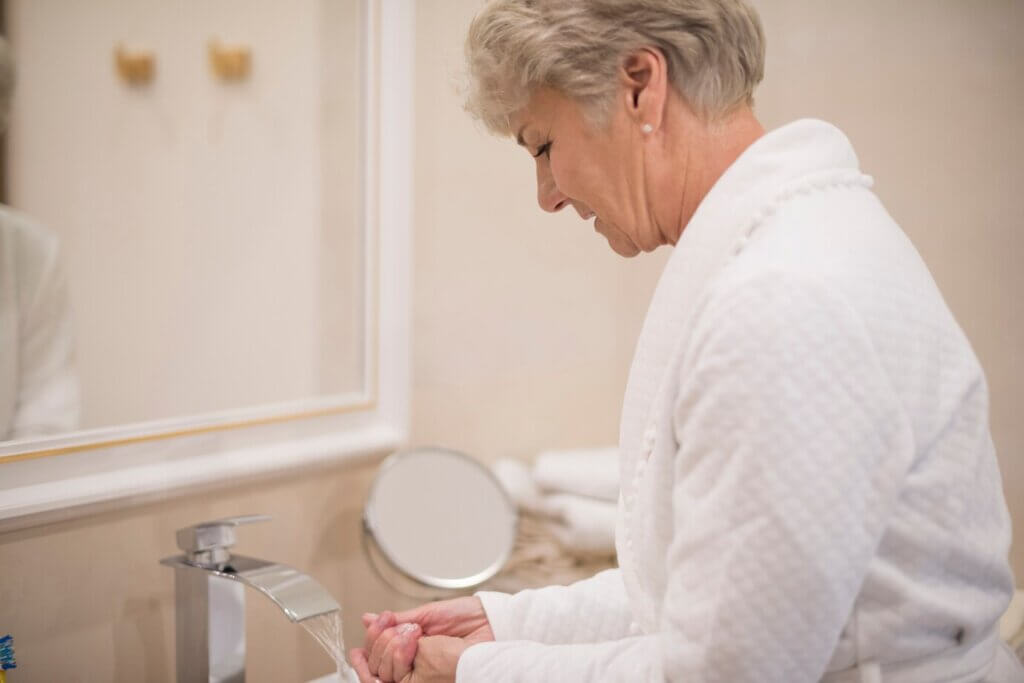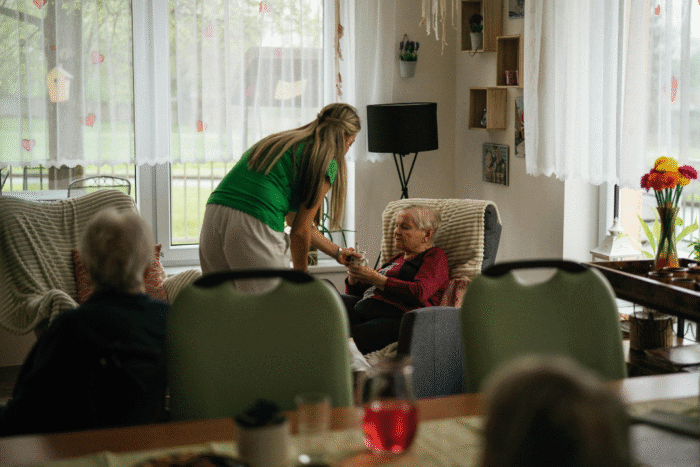7 Vital Tips for Seniors: Respiratory Diseases Defense

As we age, safeguarding our health becomes paramount, especially against respiratory diseases that can significantly impact our quality of life. At Central Scottsdale Assisted Living by MD Senior Living in Scottsdale, AZ, we understand the importance of proactive measures to protect seniors’ well-being. This guide will explore seven essential tips tailored to seniors, focusing on defense against respiratory illnesses. Let’s dive in and empower ourselves with the knowledge to stay healthy and resilient.
1. Maintain a Clean Living Environment:
Ensuring a clean living environment is crucial for respiratory health. Dust, allergens, and pollutants can exacerbate respiratory conditions, making it essential to keep living spaces tidy.
- Regularly dust surfaces, vacuum carpets, and wash bedding to minimize allergens.
- Use air purifiers to filter out airborne particles and maintain indoor air quality.
- Keep windows closed during high pollen seasons and use air conditioning to filter outdoor air.
Maintaining cleanliness reduces respiratory irritants, promoting better lung health and overall well-being for seniors.
2. Practice Good Hygiene Habits:
Good hygiene habits are fundamental in preventing the spread of respiratory infections. Seniors should prioritize practices that reduce the risk of exposure to pathogens.
- Wash hands frequently with soap and water for at least 20 seconds, especially before eating or touching the face.
- Use hand sanitizer containing at least 60% alcohol when soap and water are unavailable.
- Cover mouth and nose with a tissue or elbow when coughing or sneezing to prevent spreading respiratory droplets.
By incorporating these habits into daily routines, seniors can lower their chances of contracting respiratory illnesses and protect themselves and others.

3. Stay Active and Exercise Regularly:
Regular physical activity benefits respiratory health, improving lung function and circulation. Seniors should engage in exercises suitable for their fitness level to promote respiratory strength.
- Incorporate activities like walking, swimming, or tai chi into daily routines to improve cardiovascular health and lung capacity.
- Practice deep breathing exercises to enhance lung function and oxygenation.
- Consult healthcare professionals to develop personalized exercise plans tailored to individual needs and limitations.
By staying active, seniors can maintain respiratory health, reduce the risk of respiratory diseases, and enhance overall well-being.
4. Follow a Nutritious Diet:
A balanced diet is vital in supporting immune function and respiratory health. Seniors should prioritize nutrient-rich foods that strengthen the body’s defenses against respiratory infections.
- To boost immunity, include plenty of fruits and vegetables rich in vitamins C and E, antioxidants, and phytonutrients.
- Consume lean proteins, whole grains, and healthy fats to support muscle strength and energy levels.
- Stay hydrated by drinking adequate water and avoiding excessive caffeine and alcohol, which can dehydrate the body.
Seniors can fortify their immune systems and promote optimal respiratory health by nourishing the body with essential nutrients.
5. Get Sufficient Sleep:
Adequate sleep is essential for immune function and overall respiratory health. Seniors should prioritize quality sleep to support their body’s natural defense mechanisms.
- Aim for 7-9 hours of sleep per night to promote immune function and tissue repair.
- Establish a relaxing bedtime routine and create a comfortable sleep environment conducive to restful sleep.
- Seek treatment for sleep disorders such as sleep apnea or insomnia to optimize sleep quality and duration.
Prioritizing sleep hygiene contributes to overall well-being and enhances the body’s ability to fend off respiratory illnesses.
6. Stay Up-to-Date with Vaccinations:
Vaccinations are critical for preventing respiratory infections and complications, particularly for seniors with weakened immune systems. It’s essential to stay up-to-date with recommended vaccines to protect against common respiratory illnesses.
- Receive annual flu vaccines to reduce the risk of influenza and its potentially severe complications.
- As healthcare providers recommend, get vaccinated against pneumococcal diseases, such as pneumonia and meningitis.
- Discuss additional vaccines, such as the COVID-19 vaccine, with healthcare professionals to stay protected against emerging respiratory threats.
By prioritizing vaccinations, seniors can bolster their immune defenses and reduce the likelihood of respiratory infections.
7. Seek Prompt Medical Attention:
Prompt medical attention is crucial for seniors experiencing respiratory symptoms or illnesses. Early intervention can prevent complications and improve treatment outcomes.
- Monitor respiratory symptoms such as cough, shortness of breath, or chest pain and seek medical advice if symptoms persist or worsen.
- Follow healthcare provider recommendations for managing chronic respiratory conditions such as asthma, COPD, or bronchitis.
- Stay informed about local respiratory disease outbreaks and adhere to public health guidelines to minimize exposure risks.
By addressing respiratory concerns promptly, seniors can receive timely care and support to maintain their health and well-being.
Conclusion:
As seniors, safeguarding against respiratory diseases is paramount for maintaining optimal health and well-being. By following these seven essential tips—keeping a clean living environment, practicing good hygiene habits, staying active, following a nutritious diet, getting sufficient sleep, staying up-to-date with vaccinations, and seeking prompt medical attention—seniors can proactively defend themselves against respiratory illnesses. At Central Scottsdale Assisted Living by MD Senior Living in Scottsdale, AZ, we prioritize seniors’ health and offer support and resources to promote respiratory wellness. Let’s prioritize our health and empower ourselves to thrive in every season of life.
FAQs:
- What are the common symptoms of respiratory diseases in seniors?
- Common symptoms include cough, shortness of breath, chest discomfort, wheezing, and respiratory infections such as pneumonia or bronchitis.
- Why are seniors more vulnerable to respiratory diseases?
- Seniors may have weakened immune systems, underlying health conditions, reduced lung function, and age-related changes that increase susceptibility to respiratory illnesses.
- How can seniors protect themselves during flu season?
- Seniors can protect themselves by getting annual flu vaccines, practicing good hygiene habits, avoiding close contact with sick individuals, and following public health recommendations.
Takeaways:
- Prioritize cleanliness and good hygiene habits to reduce respiratory irritants and prevent infections.
- Stay physically active, maintain a balanced diet, and prioritize sleep to support immune function and respiratory health.
- Stay up-to-date with vaccinations and seek prompt medical attention for respiratory symptoms or illnesses.
- Central Scottsdale Assisted Living by MD Senior Living in Scottsdale, AZ, offers support and resources to help seniors maintain respiratory wellness.
At Central Scottsdale Assisted Living by MD Senior Living in Scottsdale, AZ, we’re here to help you implement these tips and ensure your respiratory health remains a top priority. For personalized assistance or further information, contact us at 619-831-1112.






Leave a Comment